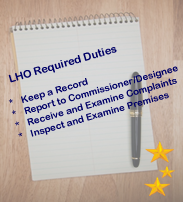DHHS → MeCDC → Public Health Systems → Local Health Officers → LHO Training → Section 4 → Duties and Limits to Duties
Local Health Officer Training
Section 4: Appointments and Duties
 Statutory Duties
Statutory Duties
Your duties may be termed mandatory or implied. Therefore, it is important for you to know what you are legally required to do, and what actions are not authorized. The LHO's duties are outlined in Title 22 M.R.S.A. §454-A The LHO has four primary functions:
- Overall health resource to the community
- Mediator-problem solver
- Investigator-Enforcer
- Reporter to:
- Board of Selectman/City Council Board of Selectman/City Council on community's public health status;
- Maine CDC/DHHS on any perceived local public health threats.
Duties Defined: (two categories)
1. Mandatory duties involve a legal duty to conduct or perform a specific task (i.e. you are obligated to act). Another legal term used is "shall" or "must," which means you have to perform certain tasks. Implied duties often support the mandatory duties, but in some cases, they may not be related.
2. Implied duties or "authorized duties" means you may, or are permitted to carry out a particular act. Implied duties improve the quality of life and help keep the community functioning at the best possible level. In most cases, these duties depend on individual initiative. They improve the situation and motivate LHOs to carry out a duty because they want to, not because they are required to do so.
Addition material
- 10-144, Chapter 258: Rules for the Control of Notifiable Conditions (new window) (word*)


